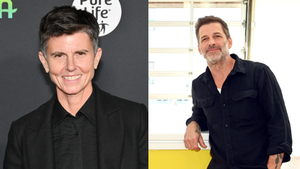March 06 2008 11:00 PM EST
CONTACTCAREER OPPORTUNITIESADVERTISE WITH USPRIVACY POLICYPRIVACY PREFERENCESTERMS OF USELEGAL NOTICE
© 2025 Pride Publishing Inc.
All Rights reserved
All Rights reserved
By continuing to use our site, you agree to our Privacy Policy and Terms of Use.
Ultimately, my best writing begins in the car. One August morning two years ago when I set out for a party in Twentynine Palms, Calif., I was planning to write a novel full of shoot-outs and car chases, with loads of technical detail that would show everyone how well I had done my homework. But somewhere around Palm Springs, the novel that I would eventually hand my editor a year and a half later started to blow in through my car's air conditioning vents. A wildfire is to blame.
I had just started research for my fourth novel, Blind Fall, when one of my contacts, a second lieutenant in the U.S. Marine Corps, invited me to attend a party for his unit in Twentynine Palms, an isolated high-desert community two hours by car from Los Angeles and home to the largest Marine Corps base in the world. I was frightened by the idea of driving out to one of the most rural and conservative towns in Southern California, but there was no way I could turn down the invitation. I had made a commitment to myself that if I was going to write an entire novel about marines both gay and straight, I had to exert every effort to capture the behaviors and attitudes of real fighting men. That meant no relying on the abundant sexed-up depictions of "devil dogs" found in porn films and erotic stories. That meant attending parties that would make my palms sweat, with guys who looked ready and willing to snap me in half. Indeed, John Houck, the hero of Blind Fall, is my first unabashedly straight character, which means he doesn't end up falling in love with a character who looks exactly like me halfway before the novel is through.
Mount San Jacinto towers over 10,000 feet above the Coachella Valley. The mountain's base sits on one of the rare sections of land in California away from the coast that is exactly at sea level. That afternoon, as I approached Palm Springs, where I had rented a room for the night, a wildfire was burning out of control on the mountain's barren, unpopulated northern flank. Firefighting helicopters were rising and descending from beside the windmill farms that fill Banning Pass. The smoke column was blowing east. It filtered the sunlight, bathing Palm Springs in a terra-cotta glow that suggested a nuclear strike. Later that night, when I returned from Twentynine Palms, the fire was still going.
Because only the burning portions of the mountain were visible at night, the top of Mount San Jacinto looked like a giant floating honeycomb.
The party was interesting enough. Just as I expected, it offered up small, authentic details of Marine Corps life, a few of which actually made their way into the final draft. The wildfire, on the other hand, opens a chapter. What I truly learned on that trip was that my hero would be the kind of man who would be awestruck by the sight of flames burning through the night atop a 10,000-foot mountain. He would have to be the kind of man who might see it as an omen. (Given that Hurricane Katrina would deluge my hometown not 48 hours later, maybe an omen is exactly what it was.)
This was a far more important discovery about my main character then whether or not it was authentic for him to refer to women as "chicks." It meant I was about to write a novel about a man in the midst of a moral crisis, not a prolonged shoot-out -- something I wouldn't have figured out at my desk. I don't believe there is a manual on writing fiction that has a chapter called "Travel," but someone should write one. Whenever I leave my familiar surroundings, I am more vulnerable to the next story, and if I keep driving long enough, I may run into the character hiding inside it.
New York Times best-selling author Christopher Rice's most recent novel is "Blind Fall" (Scribner, March 2008)
From our Sponsors
Most Popular
Just in Time for Pride – The 15 Gayest Cities in the World in 2023
April 12 2023 6:47 PM
The 13 Least Visited National Parks
January 07 2023 5:00 AM
Get Soaked! with These 35+ Steamy Pool Pics From This Year’s White Party
May 25 2023 9:29 AM
20 Thirsty Pics of #SniffiesRush Campaign Celebrating Frat Life
December 16 2022 3:19 PM
25 Thirsty Pool Party Pics from White Party Palm Springs 2022
April 14 2023 5:55 PM
Sniffies Reveals Horniest Cities
December 22 2022 4:15 PM
15 Thirsty Pics of Moot Lingerie for Men
March 21 2023 7:41 AM
The 7 Best Nude Beaches for Gays in the U.S.
June 09 2022 4:00 AM
The Most Dangerous (& Safest) Countries for LGBTQ+ Travel
March 22 2023 5:00 AM
Outtraveler: Featured Video
Latest Stories
A gay solo traveler goes bear-hunting in Barcelona
November 13 2025 4:31 PM
More than a month: Prioritizing LGBTQ+ health year-round
October 15 2025 12:27 PM
UNITY at Sphere is the perfect Las Vegas attraction for gay tourists
October 03 2025 5:09 PM
Malta is the secret Pride destination where gays are going wild
September 18 2025 4:47 PM
What is a Jubilee? These Catholics just became the first LGBTQ+ people to participate
September 08 2025 12:49 PM
Marriage equality will be banned in these 31 states if Obergefell is overturned
September 08 2025 10:40 AM
Explore the camp, parties, and parade of Provincetown Carnival 2025
September 05 2025 7:03 PM
My big gay Broadway summer
August 27 2025 9:27 AM
Explore Zurich with Swiss style icon Susanne Bartsch
August 25 2025 9:46 AM
Splash House is the secret Pride festival where gays can truly let loose
August 22 2025 9:00 AM
When love sinks, set sail for the Hudson Navigator
August 15 2025 6:00 AM
Need an escape from American anxiety? Consider Colombia.
July 16 2025 11:47 AM
This heavenly hotel in the heart of Hell's Kitchen is the perfect oasis
June 26 2025 6:00 AM
Top 10 LGBTQ+ beach towns perfect for Pride and summer fun
June 05 2025 1:54 PM
Checking out: nhow London, the city’s coolest hotel
June 02 2025 8:45 AM
Cruising the world helped this gay couple find lasting love
May 31 2025 2:45 PM
Gays went feral at an iconic Pride celebration in Pensacola, Florida
May 30 2025 6:00 AM
Wilderness, woods, and Wigstock: Drag icons light up the Catskills
May 28 2025 12:17 PM
Out and About with Christian Cooper
May 28 2025 11:07 AM












































































